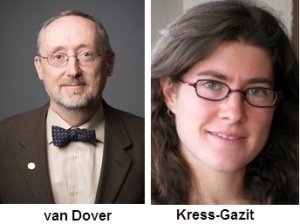Jul 20 2017
Autonomous systems and artificial intelligence have been making headlines recently for what they can do now – and for what’s possible in the future. And a pair of Cornell research groups have just been granted up to $15 million from the U.S. Department of Defense to have a say in that future.
 (Credit: Cornell University)
(Credit: Cornell University)
Groups led by Robert Bruce van Dover, professor in the Department of Materials Science and Engineering, and Hadas Kress-Gazit, associate professor in the Sibley School of Mechanical and Aerospace Engineering, have both received up to $7.5 million funding from the Department of Defense under its Multidisciplinary University Research Initiative (MURI).
The program recently awarded 23 grants totaling up to $163 million over five years. All grantees are guaranteed three years of funding at $1.5 million per year, with the final two years dependent on satisfactory research progress and the availability of funds.
Van Dover’s group is working on a project titled “Scientific Autonomous Reasoning Agent (SARA): Integrating Materials Theory, Experiment and Computation.” Their goal is to develop a multi-agent system that accelerates the science of materials discovery and development by integrating quantum physics principles, experimental materials synthesis, processing, characterization and AI-based algorithms.
The system will be augmented by human insights so that artificial intelligence leverages that of expert scientists. This, the group said in its summary, will create an unprecedented platform for human-machine collaboration.
The group claims that SARA will realize the vision of the Materials Genome Initiative, a multi-agency initiative launched in 2011 to create a new era of policy, resources and infrastructure by discovering, manufacturing and deploying advanced materials.
Van Dover will work with Carla Gomes, professor of computer science; Bart Selman, professor of computer science and director of the Intelligent Information Systems Institute; and Michael Thompson, associate professor of materials science and engineering. Researchers from Colorado University, Northwestern University and California Institute of Technology are also on the team. Staff scientist Jacob Ruff from the Cornell High Energy Synchrotron Source will work with the group as an unfunded collaborator.
Kress-Gazit’s project is titled “PERISCOPE: Perceptual Representations for Actions, Composition and Verification.” The group’s goal is to develop autonomous systems capable of completing complex missions in unstructured and changing environments through the synthesis of ideas from control, perception, learning and verification.
The group’s vision, in part, is to create physical systems that are able to self-assess and self-repair within their environment, thus making them resilient to unexpected change. Work will focus on the idea that, instead of assuming that a system will always behave correctly, algorithms can both verify and falsify components (perception and action) with respect to explicit assumptions that will be monitored during deployment.
Novel to this project is the notion of perception-in-the-loop verification/falsification – reasoning about a component’s correctness with respect to sets of environments and associated uncertain perceptual information. In short, the system will reason about its performance and autonomously detect when it needs to repair itself.
Kress-Gazit’s collaborators include Mark Campbell, the John A. Mellowes ’60 Professor of Mechanical Engineering, and Kavita Bala, professor of computer science. Other researchers are from Brown University and Massachusetts Institute of Technology, along with an unfunded collaborator from the University of Montreal.